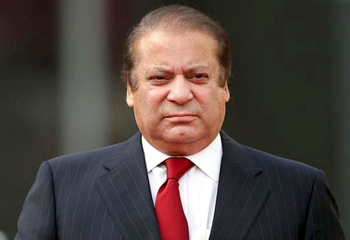Islamabad, Jul 18: As the Supreme Court is set to pronounce its verdict in the Panama Papers, the Pakistan Tehreek-i-Insaf (PTI) on Tuesday said it will wait for the court`s decision before calling on the people to take to the streets and force Prime Minister Nawaz Sharif to resign from his post.On the other hand, the Pakistan Peoples Party (PPP) has warned Sharif that he will be coerced to leave histhis post if he does not resign on his own, reported the Dawn.
"Our party will wait for the Supreme Court`s decision," PTI spokesman Fawad Chaudhry said.Chaudhry said the decision to wait has been made by the party, adding that the party will not organise big rallies or public meetings till the court announces its decision, but will hold small party conventions at various places."We do not want to give an impression that we have taken out people on the street before the apex court`s verdict, but we want to keep our workers charged so that they remain ready for any call by the chairman," he said.
Earlier on Monday, a Justice of Pakistan Supreme Court, who is heading the three-judge implementation bench hearing the Panama Papers case, said that the Joint Investigation Team`s (JIT) findings against Sharif`s family are not obligatory on the apex court."The JIT`s findings against Sharif family are not binding on the Supreme Court," the Express Tribune quoted Justice Ejaz Afzal Khan as saying during the hearing.The apex court questioned whether Sharif received monthly salary from FZE, an offshore company, as revealed in the JIT report.
According to the report, Justice Sheikh observed that the JIT obtained documents related to FZE through Mutual Legal Assistance (MLA) from United Arab Emirates under the National Accountability Bureau (NAB) law as those were certified and not source documents.Meanwhile, Justice Ejaz observed that it was debatable whether the documents could be accepted without questioning the people who signed them.The top court is likely to either put Sharif on trial on corruption charges or even disqualify him.However, the few are expecting the judges to dismiss the case after the JIT submitted a damaging report into Sharif`s family wealth.
Earlier, Sharif`s lawyers and Finance Minister Ishaq Dar, submitted separate objections to the JIT report in the apex court today.A three-member apex bench, headed by Justice Ejaz Afzal Khan, and comprising Justice Sheikh Azmat Saeed and Justice Ijazul Hassan, after the JIT began hearing the case as the JIT submitted its final report on July 10.The report pointed out a categorical foul play on part of the Prime Minister, his children and other family members in their wealth details linked to offshore companies unearthed in Panama Papers.
The report also found respondents guilty of being beneficial owners of multiple offshore companies and recommended initiation of reference against Sharif and his family members in the National Accountability Bureau.In the objections filed before the court, the Sharif family and the Finance Minister rejected the JIT report and argued that the team violated its mandate, reports the Dawn.
Meanwhile, PTI lead counsel Naeem Bukhari in his arguments highlighted certain findings from the JIT report, including the alleged false testimony of Tariq Shafi, who is Sharif`s cousin and a key respondent in the case.Shafi recorded a false testimony earlier regarding an agreement that he made in 1980 with Abdullah Kayed Ahli, the owner of Ahli Steel Company, Dubai in which Shafi held 25 per cent shares, said Bukhari.
The trust deed of the four flats located in London`s upscale Park Lane neighbourhood, executed between Maryam Nawaz and Hussain Nawaz - the Prime Minister`s children - in February 2006, was found to be false by the JIT, Bukhari told the apex bench.The counsel representing Sharif`s sons in the case, Salman Akram Raja, had argued before the SC in February that bearer certificates of the flats had remained with Maryam between February and July 2006. However, they were cancelled upon execution of the trust deed and registered under Minerva Services Limited - an entity that appointed directors for the two offshore companies, Nielson Enterprises Ltd and Nescoll Ltd. that owned the four flats.
The court is expected to either put Sharif on trial on corruption charges, or even disqualify him, but few expect the judges to dismiss the case.





Comments
Add new comment